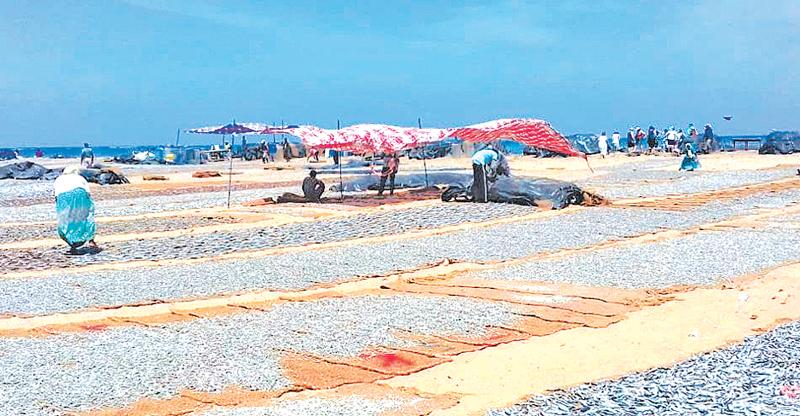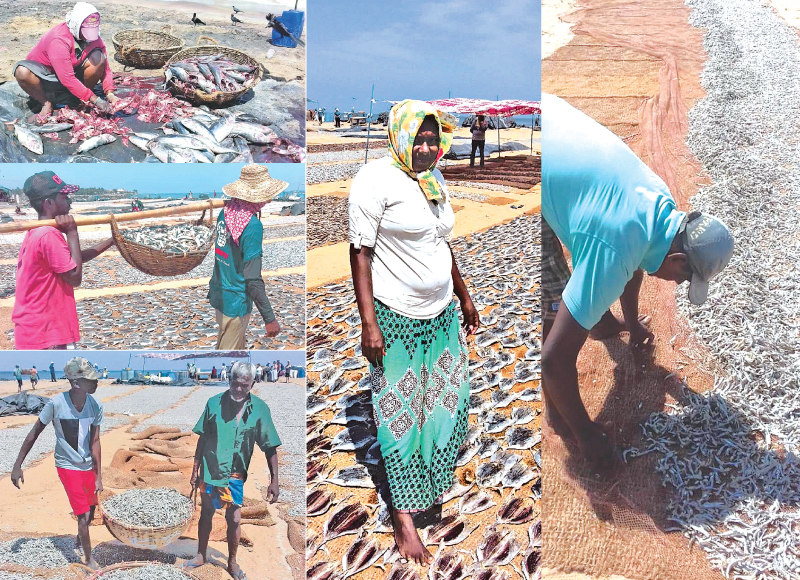
She is shy and refuses to tell us her name. Her robust figure and firm breasts indicate her powerful upper body strength- not by working in a gym, but by carrying baskets of dried fish
To many people who go in search of fresh fish, the market of Negombo is a paradise. Yet there lies a greater Eden about 2 kilometres away from the fresh fish market. This is the magnificent dry fish processing arena- right on the beach. As Terry and I got down from the tuk-tuk the pungent smell of drying fish permeated the air. There was a statue of the Virgin Mary, as almost all folk engaged in this enterprise are devout Catholics. For as far as my eye could see there were row upon row of drying fish that was heavily salted. After finding a path to walk we met Roshan, a young man. He was busy turning the sprats with his bare hands. He greets us and explains “As you see we make the best dry fish in the country here. We get the fish from the boats - and then coat them in salt. The sun is so intense these days that the fish dry completely in two days”.
There are others around Roshan, young men bending and turning the fish. They add “You may have eaten jardi. In this process we immerse the larger cuts of fish in a mixture of brine, salt, saffron and gorraka. After a few days in a barrel the fish is fully fermented. It goes down well with rice”. This item however has not been featured in authentic Sri Lankan culinary festivals, and yet it remains a genuine fish product of our island.
Another young woman is walking amidst the rows of fish. She is shy and refuses to tell us her name. Her robust figure and firm breasts indicate her powerful upper body strength - not by working in a gym, but by carrying baskets of dried fish. She says “Sir, we work hard in the hot sun. We are also young people like you, yet at times we face the social stigma of being fisher folk. We do this work as this is of our generation and family tradition. Perhaps in the future it may change”. The young woman explains that during the rainy season they don’t get work and at times the fish in the process of drying can go stale and they would incur a loss. By now a group of curious Chinese have arrived and they are mesmerized by the extent of dried fish. As we walk along this maze of deep sea delights we spot a young man and his uncle carrying a basket of fish on a pole. This pair moves back and forth. Along the left side of this beach are a few shops. Some vendors are selling baskets - used to carry the dry fish. Others are selling long reels of coir - woven rugs, on which the fish is spread out to dry. A tiny kiosk sells plain tea.
The pot bellied man behind the counter grins and displays his teeth, stained red by chewing betel. A well nourished tabby cat sits below and yawns.
Further along the beach a group of women are cutting and filleting large fish. I ask one of the girls to look at the camera, she is sharp and replies” Aiyo if I look at your camera, I may in those few seconds slice one of my fingers”. As she giggles she shows us the sharp knife, which by years of experience she cuts away with refined dexterity. This is the primary part of the dry fish process. These young women cut the head of the large fish and clean the rest of the fish. Then like opening a book the fish are “opened from the middle”.
After this the fish is immersed in cold water. A young man comes towards me. His name is James, the name is reminiscent of one of the disciples of Jesus - and many of them were fishermen. James carries the washed fish and begins to caress each fillet with a hand full of salt.
This is the vital part of curing the fish. The fish heads are discarded and collected in a large barrel. In the New Testament Jesus Christ tells his disciples “You are the salt of the earth” - implying that believers should manifest the true essence of life. Here to these young men on the beach of Negombo, salt takes a greater importance – it literally sustains their livelihood.
When asked about prices they sell only wholesale, although there were a few small shops. The youth opined that the “fish mudalali”- is the man who decides the price at the daily auction. Like the defiant Alpha male in the food chain, these dominating businessmen control the prices, making profits. The young people working in this enterprise begin their day at 7 am and work around the clock. They have to ward off intruding crows and other birds that try and swoop in for a free meal. After a hard day’s work their primary aim is to wash the strong smell of dried fish from their hands. Amidst the sweltering sun and hard work these youth have good attitudes and smiles. Their life is simple. They talk and drink plain tea.
They share their rice and curry. They pray. Hopefully in the future their dried fish will be sold in a more appealing way to domestic customers. As I said before in comparison to meat, poultry and forms of seafood, dried fish has not been a desired choice on many domestic menus. The vast dry fish operation on the beaches of Negombo is a must visit place for all who love seafood.
This is where seafood is really enhanced. It is a beautiful manifestation of youthful community spirit.

